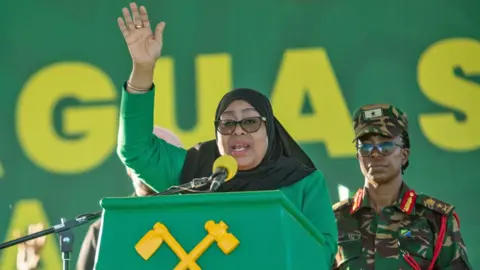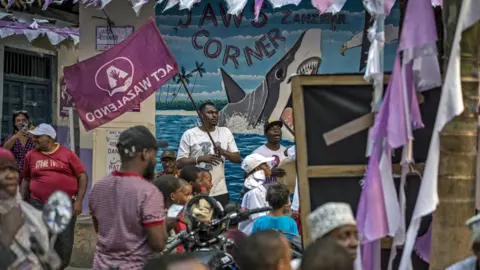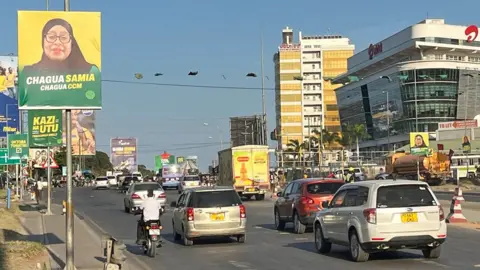Tanzania's First Female President Faces Uncontested Election as Opposition Dwindles

 EPA/Shutterstock
EPA/ShutterstockWith no heavyweight opposition candidates cleared to compete in Wednesday's election, many Tanzanians feel the vote is less like a contest and more like a coronation for President Samia Suluhu Hassan, as she faces her first presidential election.
The 65-year-old became the East African nation's first female head of state after the death in 2021 of sitting President John Magufuli. He was admired for his no-nonsense approach to corruption, but criticized for his authoritarian governance and handling of the Covid pandemic.
Initially, President Samia portrayed a breath of fresh air, adopting a friendlier, reform-oriented approach that marked a departure from her predecessor's policies.
Her "four Rs" policy—reconciliation, resilience, reform, and rebuilding—has sought to re-engage foreign investors and improve relations with international financial institutions like the IMF and World Bank.
However, in recent years, political repression has reportedly intensified under her administration, with frequent reports of abductions and violence against dissenters.
Critics assert that while Samia initially promised conciliation, she has increasingly been seen as more authoritarian, facing blame for the same issues of repression that plagued her predecessor.
According to Freedom House, Tanzania has shifted from being rated as “partly free” to “not free” due to the crackdown on civil liberties.
Samia's party, Chama Cha Mapinduzi (CCM), has dominated Tanzanian elections since multi-party democracy was reinstated in 1992, typically engaging in vibrant campaigns. This time, however, despite 17 candidates being cleared, the primary opposition party, Chadema, is barred from participating as its president Tundu Lissu faces treason charges.
Chadema has encouraged supporters to boycott the upcoming elections, a sentiment echoed by other candidates whose attempts to participate have been thwarted. The absence of credible opposition raises concerns about electoral legitimacy.
Political analysts suggest that heightened control by the ruling party, exclusion of dissent, and institutional bias significantly undermine the credibility of these elections.
With widespread disappointment expressed by voters like Dar es Salaam's Godfrey Lusana, many feel that the lack of real competition renders the elections a foregone conclusion.

 AFP/Getty Images
AFP/Getty ImagesAmidst this political climate, the situation in Zanzibar starkly contrasts, where vibrant campaigning continues. Incumbent President Hussein Mwinyi of the CCM faces significant competition from Othman Masoud of ACT-Wazalendo.
On the mainland, President Samia, benefitting from her initial popularity, emphasizes promises of development through enhanced infrastructure, education, and healthcare.
She has gained the affectionate title Mama Samia, yet the growing chasm between her administration's portrayal and critics' voices raises questions about the true state of Tanzania's democracy.
Younger voters, who comprise a majority of the electorate, express mixed feelings towards President Samia. While she has inspired many women in the community, there are rising concerns about unemployment and her government's handling of dissent.
Amidst fears of reprisal, some young supporters of Samia's leadership remain hesitant to vocalize their support.
Political experts believe that if citizens feel disconnected from the electoral process, it may lead to a larger problem for President Samia amid public discontent. Activists continue to voice the need for a transparent, free, and fair political landscape in Tanzania.

 Getty Images/BBC
Getty Images/BBCAmidst criticisms regarding her electoral ambitions, some party officials opposing her unchallenged nomination have faced severe consequences, like the noted case of Humphrey Polepole, who mysteriously disappeared after voicing dissent.
Concerns about her independence from powerful business interests are growing, with suggestions that President Samia may be acting as a pawn for influential political forces within the CCM.
The broader implications of her presidency are concerning. Rising fear and controlled media environments signal a retreat from open dialogue and public debate in Tanzania. Without substantial change, the democratic fabric of the nation is in jeopardy, raising questions about the future of Tanzania's leadership and governance structure.



















